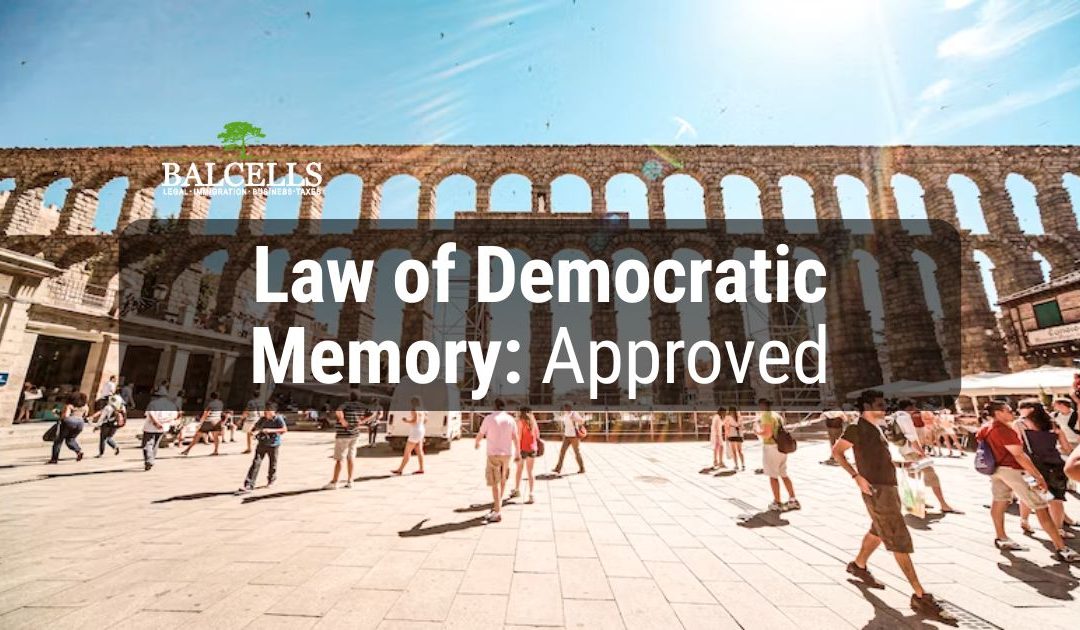Good news! On October the 5th, the Law of Democratic Memory was approved in the Spanish Senate, the last step before its final publication and entry into force; which will enable thousands of Spanish descendants to obtain citizenship in the country.
In this article you are about to learn what this Law will consist of exactly, how it will work, who will be able to benefit from it, and when it will come into force.
What is the Democratic Memory Law for citizenship?
The Democratic Memory Law is a regulation that recognizes all those who suffered persecution and even violence from the beginning of the Spanish Civil War until the approval of the 1978 Constitution.
More specifically, we are talking about all those who suffered for political, ideological, conscientious, or sexual orientation and identity reasons, and who in many cases lost their Spanish nationality.
Thus, with the aim of fostering solidarity among these generations, this law intends, among other things, to guarantee Spanish nationality to the descendants of these people (as we will see below).
Until when is the Democratic Memory Law valid?
The Law of Democratic Memory came into force in October 2022. Since then, over 60,000 people have benefited from this law to acquire Spanish nationality.
Originally, the law was meant to only last for two years, that is until October 2024. However, the Democratic Memory Law has just been extended until the end of 2025.
Those eligible to apply for Spanish citizenship under this law have one more year to make a request.
Who benefits from this law?
The Law of Democratic Memory enables the acquisition of Spanish nationality to the descendants of Spanish citizens who lost it.
However, we must be careful.
Not all descendants will be able to benefit from this law (such as great-grandchildren).
As we explained in our post on the Grandchildren Law, the cases that can benefit from the Law of Democratic Memory to obtain Spanish nationality by option are the following 3:
- Those born outside Spain of mother, father, grandfather, or grandmother (children or grandchildren) who were originally Spanish, and who for reasons of exile for political, ideological, or sexual orientation reasons, had renounced Spanish nationality
- Sons and daughters born outside Spain of Spanish women who lost their nationality when they married a foreign citizen before the 1978 Constitution came into force; a case that was not included in the Law of Historical Memory
- The sons or daughters of legal age of those Spaniards whose nationality of origin was recognized by virtue of the Democratic Memory Law or the Historical Memory Law.
It will be essential to be able to demonstrate that one belongs to one group or the other in detail.
Where to apply for nationality under the Law of Democratic Memory?
As you already know, there are different ways to obtain Spanish nationality, each one with its own particular procedure.
In this case, as it is a type of nationality by option, it will be requested in the Civil Registry that corresponds to the applicant’s domicile.
This means that it can be requested either in the consular Civil Registry in the country of origin, or in a Spanish one if the foreigner is in Spain.
Do you have any questions or would you like to receive personalized advice from our immigration lawyers? Reach out and we would be happy to help you!
Book a consultation with one of our lawyers and we’ll answer all your questions:

At Balcells Group we have been foreigners effortlessly moving to Spain for over 11 years. We help expats from all around the world with their immigration, business, tax and legal needs; ensuring a legally safe and enjoyable transition to the Spanish territory. Our multilingual team understands the importance of adapting to the cultural and legal specificities of our international clients. We offer a comprehensive service that combines the expertise of several generations of lawyers with the innovation needed to address today’s legal challenges, always striving to simplify processes and ensure reliable, effective results.



